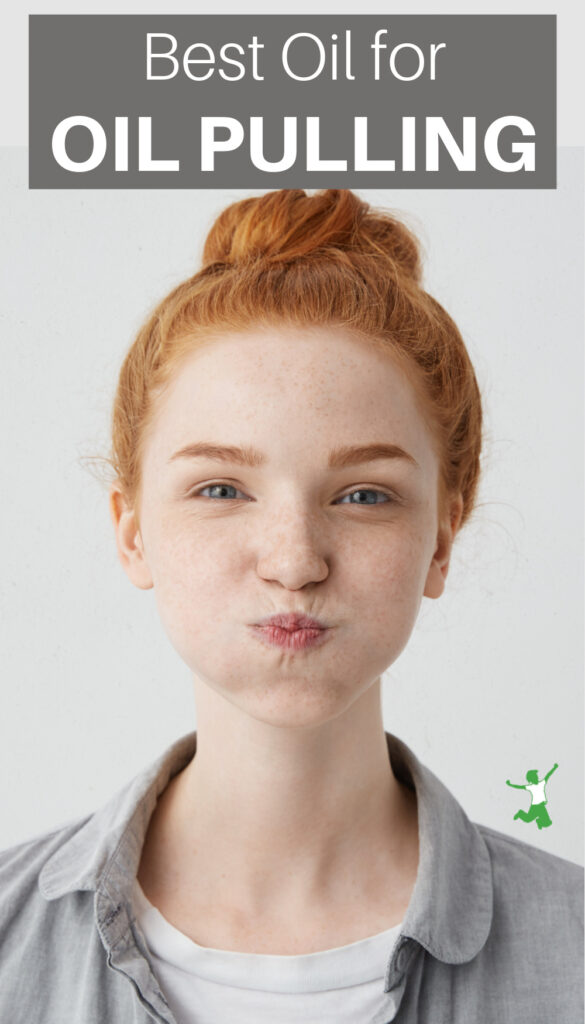The best oils to use for oil pulling for optimal benefits to oral health by eliminating toxins and pathogens from the gateway microbiome.

I first learned about oil pulling two decades ago while studying Ayurvedic cooking.
“Pulling” is an ancient detoxification therapy mentioned in ancient Ayurvedic texts and is recommended as an easy, daily practice.
Over time, “oil gargling” or “swishing” can drastically improve oral health and help resolve many chronic conditions such as periodontal (gum) disease and cavities. (1)
It can also be helpful for acute illness.
For example, oil pulling therapy has been touted as a strep throat remedy and helps resolve persistent sore throat issues.
Oil Pulling Health Benefits
The modern resurgence of this ancestral practice started in 1992 and was initiated by Dr. F. Karach, MD, who used it with great success in his medical practice.
Dr. Karach claimed that oil pulling would resolve a variety of illnesses including hormonal problems, cardiovascular disease, and digestive ailments. (2)
Dr. Bruce Fife, author of Coconut Cures and Oil Pulling Therapy: Detoxifying and Healing the Body Through Oral Cleansing, suggests that oil pulling therapy can effectively be used to clear and heal sinus problems. (3)
In fact, this is one of the first detox symptoms that are experienced is an increased flow/clearing of mucus from the throat and sinuses.
Mucous drainage is one of the body’s best methods of removing toxins.
How Does “Pulling” Work?
The practice of oil pulling is extremely simple.
Simply swish one tablespoon of raw, cold-pressed oil in the mouth for 15-20 minutes.
The swishing process involves gently pushing and pulling the oil around and through the teeth.
Try to oil pull at least once and up to three times per day on an empty stomach.
If you only do it once per day, the best time is first thing in the morning before breakfast or drinking anything. However, if you forget, any time of day before eating will do if necessary.
Dr. Fife advises the following while oil pulling:
While you are pulling, mucous may build in the back of your throat. You may even have to expel the oil and clear the mucous from your throat before reaching a full 20 minutes. That’s okay, take another spoonful of oil and continue until you’ve pulled for a total of 15-20 minutes. (4)
After swishing with the oil for the allotted amount of time, the oil is completely spat out and the teeth, gums, tongue, and palate are gently cleaned by rinsing the mouth with saltwater and brushing as usual.
Feel free to use a bit of sole water for this purpose if you have some on hand.
This next point may seem obvious, but it bears mentioning. It is important to never swallow or otherwise reuse the oil.
I think it is best to spit it out into the toilet rather than the sink because it contains toxins and bacteria and possibly even pus and mucous if an infection is present.
Which Oil is Best?
A variety of oils work very well for oil pulling.
Traditionally, unrefined sesame oil, coconut oil, or butter oil (ghee) were used.
The modern-day practice of this ancient therapy includes extra virgin olive oil or unrefined sunflower oil as alternatives as well.
While any one of these oils is likely effective, is any particular choice better than the others?
According to research performed by Irish scientists from the Athlone Institute of Technology who tested the effects of coconut oil, vegetable oil, and olive oil on dental health, the answer is yes.
Of the three types of oil tested, only coconut oil prevented tooth enamel damage by the pathogen Streptococcus mutans.
This acid-producing bacterium is a common inhabitant of the mouth and a major cause of tooth decay. (5)
This latest finding lends serious credibility to anecdotal claims that oil pulling works best with coconut oil.
Lead researcher Dr. Damien Brady stated that coconut oil could prove to be an attractive alternative to chemicals in maintaining oral health. (6)
He noted that not only does coconut oil work at relatively low concentrations but with the worrisome problem of increasing antibiotic resistance, it is important to consider coconut oil as a potentially novel new way to control microbial infections.
Dr. Fife also recommends making medicated coconut oil to enhance the effects and healing properties of oil pulling. (7)
Refined vs Unrefined
Virgin coconut oil (VCO) is the best choice for oil pulling therapy as it is truly “raw”.
This type of coconut oil is completely unheated with micronutrients and co-factors not present in refined versions. It is ideal for medicinal use.
Remember too, that coconut oil solidifies at 76 °F/24 °C, so if your virgin coconut oil is solid in the pantry, you may need to gently liquefy it in a pan of warm water first.
However, this step is not necessary if you are comfortable letting it melt in your mouth before you start swishing.
If you wish to supercharge the process, you can use ozonated coconut oil, which further enhances the anti-bacterial and anti-plaque benefits of oil pulling.
This therapeutic form of coconut oil is great for holistic dental flossing too and a practice recommended by biological dentists.
Bonus! Virgin coconut oil is an excellent oral antifungal as well.
Is Oil Pulling Right for You?
Oil pulling is probably the cheapest and easiest oral detoxification regimen you could ever try.
It simply involves swishing your mouth with unrefined oil one to three times a day on an empty stomach and then spitting it out.
No dieting, fasting, herbs, or pills are required to get started.
No matter what your age or level of health, oil pulling is harmless and nearly anyone can do it.
Sometimes powerful answers come in a brown paper bag.
Give oil pulling with virgin coconut oil a try!

(1) A review of holistic approaches to oral health
(2) Oil Pulling Therapy by Dr. Karach: Russian Folk Remedy
(3, 4, 7) Oil Pulling Therapy: Detoxifying and Healing the Body Through Oral Cleansing
(5, 6) Coconut oil can combat tooth decay, study suggests








I’ll try it! Thanks Chasey Bynum!
Ryan Thomas Broeker this might be good for you.
whats the reason for oil pulling on an empty stomach? its not like you swallow the oil. what has a full stomach have to do with a mouth full of oil? thx!
Kasey Macsay here is another article on this.
Christine- check out her site, do some research on her. I’m telling you I consider her legit, it’s up to you to do your research to determine if she is or isn’t.
Sorry but this just sounds SO disgusting!!! But, to each his own!
Ok I had never ever heard of this before now. WOW
Laura Hish just what exactly makes her “legit”. I need more proof than some article thrown on the Internet. I’m not a skeptic, I just need proof that junk thrown on the Internet is true…it’s called being wise and not being gullible. What studies have been done on this, where is all that information?
And seriously?!?!? 15-20mins 3x’s a day???? Who the heck has time to do that to proof if this is true or not??? :/
^^in addition to 2 weeks not being long enough, Dr. Fife states in his book that oil pulling is a tool that is useful for removing harmful bacteria from the mouth. That is its purpose. If you have an active infection in the mouth, it can pull out the offending bacteria, giving the body the chance to heal itself. It is the body that brings about the cure, not the oil pulling. If the body doesn’t heal, it is not because oil pulling did not work, it is because the body was unable to do the healing….you can’t expect a cure overnight. Dr. Fife has guidelines for eating and a host of other recommendations to aid healing. I just finished reading his book, Oil Pulling Therapy. I was so convinced by his evidence that I will do this everyday for the rest of my life. If you are serious about healing your body buy the book, it will answer all your questions. Oh and if you have amalgam fillings he addresses that in the book. If the filling comes out its a good thing because if it was that loose there are also bacteria under the filing further decaying your tooth. Get those fillings removed by a dentist trained to do that, they’re toxic in your body. Everyone needs to read this book. Oil pulling has been oversimplified as it is simple to do but the consequences of not understanding why you’re doing it and then giving it up could leave you with cronic illness or early death.
But get rid of that no stick, lethal pan!
I used to have one that looked just like it and it was titanium.